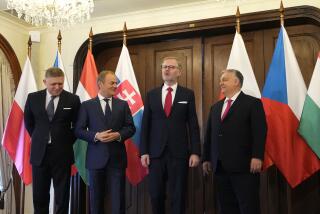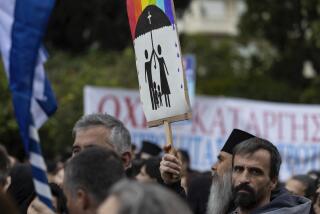THE PULSE OF EUROPE : Eastern Europe : A Mosaic of Broad Contradictions
- Share via
In the aftermath of the revolutions of 1989, Eastern Europe has become a discordant mosaic of contradictions, ambiguities and animosities.
Assessed most ominously, the results of the Times Mirror poll give rise to fears of new crises among the largely Slavic nations stretching thinly from the Baltic to the Black Sea. The peoples of Eastern Europe, simply put, do not like their neighbors. Their ethnic divisions are so sharp, and their national hostilities so deep, that radical improvement of relations probably must wait for generations to come. “What I call the cemetery problem,” says one Pole, only half-joking. “Those who suffered grievances will have to be buried before we see any improvement.”
Current national borders seldom coincide with ethnic and religious boundaries. Blood cousins live just across the rivers and roads that make up the frontiers. So it is not surprising that nationalist forces, long suppressed by Communist rulers, have erupted into violent demands for greater independence or political autonomy, as in Yugoslavia. And people in all Eastern European states, except the former East Germany, believe that parts of neighboring nations really belong to them.
But there also are indicators that democracy is taking root and that free market instincts have not perished under the weight of 45 years of Soviet-style communism. So while there is potential for calamity, there also are exciting signs of renewal. “History,” said a shop manager in Prague, “proceeds here.”
East Europeans today rate their personal lives one-third below West Europeans, 4.2 against 6.1 on a 10-point “ladder of life.” And while West Europeans believe their plight has improved over the past five years, Easterners have experienced a demoralizing decline.
Nevertheless, with the exception of the Hungarians--among whom pessimism is culturally endemic--East Europeans are generally optimistic about their personal futures. Most remarkable is the extreme optimism shown by Bulgarians, despite that nation’s harsh economic realities.
Czechoslovaks are generally upbeat too, rating their lives a third higher than others in East Europe. But much of that feeling may be tied to trust in the country’s highly popular president, Vaclav Havel. Meanwhile, the Slovaks, who constitute the poorer third of the federated country, are almost as pessimistic as Hungarians.
East European fears center overwhelmingly on economic problems, particularly unemployment.
Political concerns did rate high in some places. When people were asked what would make them personally happy, 23% of Bulgarians mentioned political stability. No other nation, East or West, cited this as a reason for personal happiness. Soviet republics face graver issues--including civil strife--than the materialistic worries elsewhere. Bulgarians were particularly concerned about a return to their authoritarian past.
For most, though, bread-and-butter issues have the highest priority. Hungarians and Czechs fear a further collapse of the Soviet economy, for instance, and a flood of refugees.
Eastern Europeans approve of the revolutions of 1989, but dislike many of the effects. Enthusiasm is generally higher for economic restructuring than political reform.
Among negative changes cited were deteriorating law and order, and interpersonal and ethnic relations; most believe people now care less about each other. “People are irritated, uncertain,” said a Slovak economist. “Before, when two friends met, they asked: ‘How are you?’ Now they ask: ‘Do you still have a job?’ ”
The preference throughout the region is for a social democratic form of capitalism, with margins of up to 5 to 1 favoring a “Garden of Sweden,” as it were, rather than the relatively unfettered free market of the United States. Huge majorities want the state to retain a dominant role in major industry and transportation, controlling mining, phones, trains and the like. Most people, however, endorse private ownership of stores and restaurants.
The enterprising spirit has not been killed among East Europeans. By 2-to-1 margins, they prefer to be paid on an incentive basis. Significantly more than westerners, however, they are self-doubters about how much they control their fate. Fewer believe that hard work guarantees success--they think it’s determined by forces beyond the individual’s control.
Overall, East European society seems fragmented and disoriented--even demoralized--by the changes of the past two years. People lag in understanding new concepts like private property, profits and even democracy.
There is a great appetite for foreign investment throughout the region, for instance, but also suspicion of foreign investors, as if they intended to buy land and annex it to their own countries.
And while East Europeans still prefer that the state take care of the poor and guarantee every citizen food and shelter, they are cynical about the role of government. A majority in every country believes any state-run enterprise is usually inefficient and wasteful.
When it comes to politics, apathy is becoming widespread, particularly in local elections. Only in Czechoslovakia did a clear majority say it retains interest in politics. In Hungary, so few voted in one recent local contest, 17%, that the election had to be held again.
Of social institutions, “the church” has survived the Communist period best, with people of all nations feeling positive about its influence--even though religious beliefs are lower here than in Western Europe.
Totalitarian structures have collapsed faster than totalitarian consciousness. There is a strong inclination toward censorship, with majorities favoring banning books and political parties that are offensive. Police, meanwhile, get generally positive ratings--by a 3-1 margin in Poland. There remains, however, a lingering exception: “I’m still afraid of the secret police,” said a Prague student.
While people throughout Europe see women as having worse lives than men, the perception gets more pronounced the further eastward one goes: Women live best in the West, not as well in East Europe and far less well in the Soviet Union.
In addition, there are gender differences on key questions. Men, significantly more than women, back change toward a multi-party system and free-market economy. Women, in turn, are losing interest in politics faster than men.
Remarkably, most East Europeans--unlike Westerners--say they prefer marriages in which a husband works and the wife stays at home. It may be a case of desiring the opposite of what was encouraged by former rulers--in most of Eastern Europe, Communists wanted both husband and wife to work.
East Europeans are less tolerant of unconventional or deviant behavior than Westerners. Majorities in all nations here would bar homosexuals from teaching and not grant free speech to fascists.
The most hostile attitudes, however, were reserved for other nations and ethnic groups: More than half of Bulgarians say they never think of themselves as European, and a plurality of Czechs, Slovaks and Poles feel the same way. Czechoslovakia is even more two nations today than before the “velvet revolution,” with Slovaks angry 2 to 1 about how power is shared by the ruling Czechs.
Ethnic and religious groups too small to be a threat to the majority are nonetheless targets of animosity. Gypsies head the list, with all peoples surveyed being overwhelmingly hostile to these largely nomadic peoples. Poles and Slovaks, meanwhile, were more anti-Semitic than other nations of the region, one in three people saying they don’t like Jews. Four out of 10 Bulgarians expressed unfavorable views toward Turks.
No fewer than 68% of the people in Hungary believed parts of neighboring nations rightfully belong to their country--fallout, no doubt, from dismemberment of the Austro-Hungarian empire after World War I. In Poland, 61% of the people feel they rightly own neighboring lands. Indeed, Poles were the most xenophobic and sympathetic to the military of any people in the region.
Still, the peoples of the region appear alienated and distrustful of the social institutions that make up a functioning “civil society,” particularly their parliaments, and conscious of the danger of the authoritarianism that was their lot for centuries.
The United States rates uniformly high--more than two-thirds of all East European populations consider its influence to be positive.
More to Read
Sign up for Essential California
The most important California stories and recommendations in your inbox every morning.
You may occasionally receive promotional content from the Los Angeles Times.













